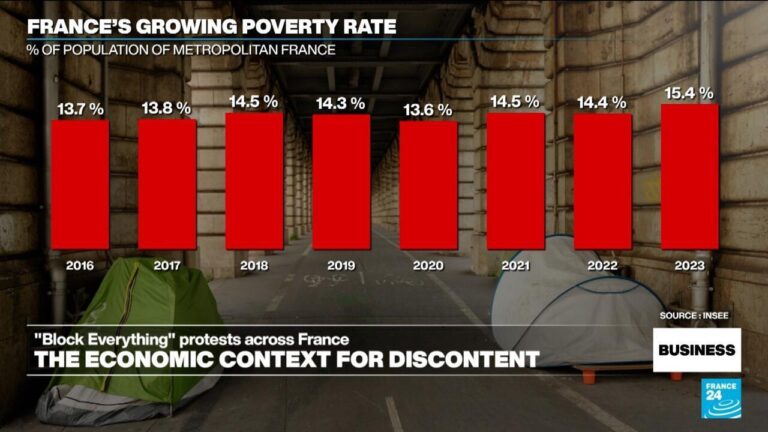France is grappling with widespread disruptions as its ‘Block Everything’ protests continue to ripple across the nation, profoundly impacting the country’s economic landscape. Sparked by contentious policy reforms and growing social unrest, these demonstrations have led to significant blockades of key transport routes and industrial hubs, raising alarm among businesses and policymakers alike. This article delves into the economic context underlying the protests, exploring how the unrest threatens supply chains, industrial productivity, and the broader financial stability of one of Europe’s largest economies.
Economic Impact of France’s Block Everything Protests on Key Industries
The sweeping “Block Everything” protests have triggered significant disruptions across multiple sectors, casting a shadow on France’s economic stability. Key industries such as automotive manufacturing, logistics, and retail have seen production halts and distribution bottlenecks, severely impeding their operations. The automotive sector, which contributes heavily to France’s GDP, reported a drop in output by over 25% during peak protest days, while supply chains experienced delays that ripple beyond national borders.
Service industries and small businesses, particularly those dependent on daily foot traffic and supply deliveries, have also borne the brunt of the unrest. Hospitality venues faced cancellations and declining revenues, while transport companies grappled with fuel shortages caused by blockades at critical depots. The economic toll extends to exporters and importers, with port congestion delaying shipments:
- Transport & Logistics: 30% reduction in daily freight movements
- Retail: Up to 40% drop in urban store footfall
- Energy: Temporary shortages affecting industrial output
| Industry | Impact | Estimated Loss (€ million) |
|---|---|---|
| Automotive Manufacturing | Production halts & supply chain delays | 450 |
| Retail & Hospitality | Revenue decline and cancellations | 320 |
| Transport & Logistics | Freight disruptions & fuel shortages | 210 |
Government Response and Policy Measures Amid Widespread Disruptions
In response to the escalating disruptions caused by the nationwide protests, the French government has implemented a series of policy measures aimed at both addressing the immediate crisis and mitigating long-term economic fallout. Key among these initiatives is the deployment of additional security forces to maintain public order and safeguard critical infrastructure. Simultaneously, officials are accelerating negotiations with labor unions and protest leaders to find common ground on contentious issues, most notably pension reforms and wage policies. These talks are viewed as essential to restore stability and confidence in the country’s economic future.
Economic relief packages have also been rolled out, focusing on sectors hit hardest by the protests. The government has introduced:
- Financial support for small and medium enterprises (SMEs) affected by supply chain interruptions.
- Temporary tax relief to ease liquidity constraints for businesses.
- Investment in public transport alternatives to circumvent ongoing blockades.
| Policy Measure | Target Sector | Expected Impact |
|---|---|---|
| Emergency Business Grants | Retail & Hospitality | Prevent closures |
| Transport Subsidies | Logistics & Commuters | Maintain mobility |
| Labor Dialogue Forums | Public Sector Workers | Reduce tensions |
Business Strategies to Navigate Uncertainty During Protests
In the face of unprecedented disruptions, businesses must adopt agile approaches to sustain operations and safeguard revenue streams. Prioritizing flexible supply chains ensures minimal disturbance when usual routes or suppliers are affected by roadblocks or protest-related shutdowns. Additionally, cultivating strong communication channels with local authorities and community groups can provide early warnings and facilitate smoother negotiations during periods of unrest. Protecting employee safety through adaptable work arrangements, such as remote work or staggered shifts, is equally critical to maintaining morale and productivity amid uncertainty.
Strategic financial planning also cannot be underestimated. Companies are advised to build robust contingency funds and reassess budget allocations to absorb potential losses linked to the protests. By diversifying sales channels—particularly by expanding online presence—organizations can mitigate the impact of declining foot traffic. Below is a quick reference table outlining key strategic focuses and their benefits during protest-driven disruptions:
| Strategy | Key Benefit |
|---|---|
| Flexible Supply Chains | Reduced operational delays |
| Community Engagement | Improved conflict anticipation |
| Remote Work Policies | Employee safety and retention |
| Contingency Budgeting | Financial resilience |
| Digital Sales Expansion | Business continuity |
- Monitor evolving protest hotspots to avoid operational disruption.
- Engage customer base through transparent updates and alternative service options.
- Leverage partnerships to share risk and resources in uncertain times.
Long Term Economic Outlook and Recommendations for Stakeholders
France’s ongoing “Block Everything” protests cast a long shadow over the country’s economic prospects, signaling potential disruptions that could extend well beyond the immediate turmoil. The long-term outlook suggests a cautious recovery trajectory characterized by slower GDP growth and dampened investor confidence. Key industries such as automotive, transport, and retail may bear the brunt of these disruptions, with supply chain interruptions and decreased consumer spending. To counteract these effects, public and private stakeholders must prioritize resilience-building measures, including diversified supply chains, digital transformation, and enhanced labor relations frameworks to mitigate future social unrest impacts.
Strategic foresight points toward a multifaceted approach for economic stabilization and growth:
- Government: Implement targeted fiscal stimulus tailored to sectors most affected by protests while fostering dialogue channels to address worker grievances proactively.
- Business leaders: Invest in automation and flexible operational models to adapt swiftly to disruptions.
- Investors: Exercise prudent portfolio diversification, focusing on resilient sectors such as technology and renewable energy.
| Stakeholder | Recommended Actions | Expected Outcome |
|---|---|---|
| Government | Enhanced social dialogue, targeted grants | Reduced tension and sector support |
| Businesses | Supply chain diversification, digital investments | Greater operational resilience |
| Investors | Portfolio diversification, focus on green sectors | Risk mitigation and sustainable returns |
To Conclude
As France navigates the fallout from the widespread “Block Everything” protests, the economic implications remain a critical concern for both policymakers and businesses. With key transport routes and commercial hubs disrupted, the immediate impact on supply chains and consumer confidence underscores the challenges facing the French economy. Moving forward, the government’s ability to address the protesters’ demands while stabilizing economic activity will be pivotal. Observers will be closely watching how this balance is struck, as the repercussions of these demonstrations continue to unfold on the national and international stages.




